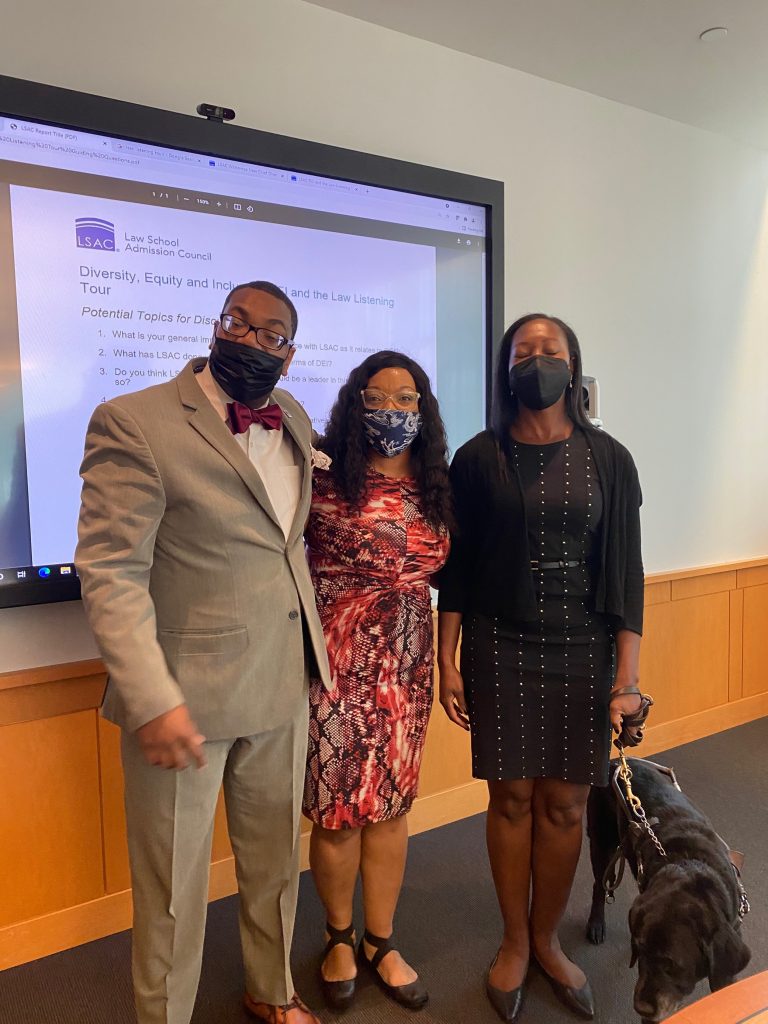“When people say, ‘Let’s move the needle of DEI,’ my question is, ‘Which dial are we looking at?’”
That’s how Angela Winfield, the newly appointed chief diversity officer for the Law School Admission Council, views the work of diversity, equity and inclusion (DEI). In September, the Fox School’s Department of Legal Studies hosted Winfield and members of the Temple community for a frank discussion on DEI in the field of law.
Winfield’s visit to Temple came on the first week of her six-month listening tour, which she had planned since joining the Council earlier this year. The Council is most well-known as the organization that administers the LSAT to aspiring law students across the country.
Winfield shared her story with the group, setting the stage for an honest conversation about obstacles and opportunities. As she told the faculty, staff and students gathered in the Fox Board Room, she didn’t think that her identities would impact her work when she first started as a lawyer at Barclay Damon, LLP. But she realized that her identities came to work with her.
“I have multiple identities. I’m a Black woman, I’m cisgender and I have a disability,” says Winfield. “There were not a whole lot of people like me, in the firm or in the legal industry.”
In her new role on the Council, Winfield’s goal is to identify and focus on three to five top goals that will help make a difference in the field and provide momentum for positive change.
Faculty, staff and students were invited to share what they see as barriers to overcome, as well as opportunities for investment.
The Fox School, according to Jeff Boles, associate professor and chair of the Department of Legal Studies, is at the forefront of working with undergraduate students who are interested in pursuing law school. He shared his experience with access issues, especially for students from under-resourced backgrounds who struggle to compete without for-profit test preparation, workshops and other costly resources.
“I have seen over my years of working in this space that many qualified students are not able to afford the LSAT or have the spare time to study,” says Boles.
The group—about a dozen faculty, staff and students from the Fox School, the Beasley School of Law and the College of Liberal Arts—also recommended efforts to focus on pipeline programs, with the aim of helping high school students prepare for college-level coursework.
Shawn Aleong, a disability advocate and Fox School student majoring in legal studies, emphasized a need to support a wide range of disabilities, from intellectual to physical.
“I don’t see too many people that have intellectual disabilities (in the industry),” says Aleong. “I was told by my high school teacher that I would not go to college because I tested so low. And right now, I’m sitting here with a 3.55 GPA in the Fox School of Business.”
Xanthe Soter, current president of Phi Alpha Delta Law Fraternity and senior at the College Liberal Art, championed the need for mental health awareness, as well as more transparency about the process and unwritten rules of becoming a lawyer.
Kamina Richardson, assistant program director in the Department of Legal Studies, recognizes the importance of mental health awareness. In her experience as the pre-law advisor at the Fox School, she says about the students, “I become their mother, their therapist, their auntie, to get them out of their anxiety. The goalpost kind of moves around based on where they are in their education.”
Richardson, who organized the conversation, has made DEI a cornerstone of her work within the field of legal education. Earlier this year, Richardson helped organize a three-day workshop co-hosted with Temple’s IDEAL highlighting racial justice and racial inequality. The workshop, “Black Americans: Justice, Equality and the Law – Three-Day Racial Equity Habit Building Challenge,” was designed to educate, enlighten and expose participants to perspectives on elements of Black history, identity and culture, and to all people of color’s experience of racism in America.
Winfield acknowledged the need for diversity but cautioned against using it as a metric. “I look at representation as an indicator but that’s not enough of a goal,” says Winfield. “I don’t want to just increase the number of marginalized faces and bodies in the profession. I want to increase the outcome.”
